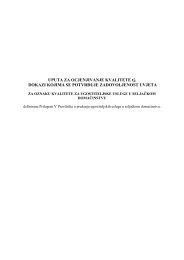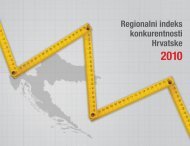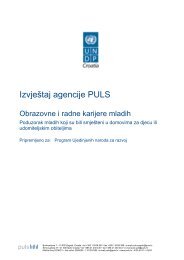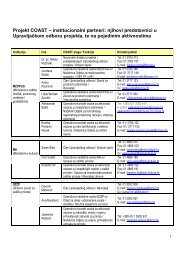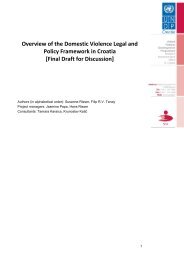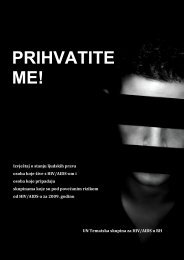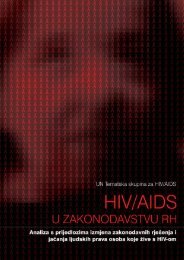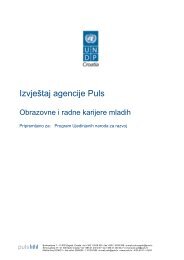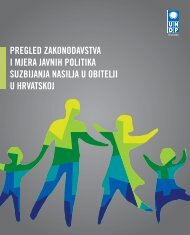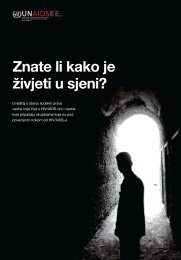WEB engleska verzija end.indd - UNDP Croatia
WEB engleska verzija end.indd - UNDP Croatia
WEB engleska verzija end.indd - UNDP Croatia
- No tags were found...
You also want an ePaper? Increase the reach of your titles
YUMPU automatically turns print PDFs into web optimized ePapers that Google loves.
THE SOCIALLY EXCLUDEDCHAPTER 3This data indicates that most women will <strong>end</strong>ureviolence and that they are not likely to seek help fromresponsible state institutions. When women do seekhelp, it is most likely to be from within their closest socialcircle, like their fri<strong>end</strong>s and relatives. This could beexplained by fear, shame stemming from a traditionalenvironment, limited access to information, negativeexperiences with certain institutions (in particular, CSW,the police and the judiciary), feelings of alienation,feeling alone in their plight (believing that violencedoes not happen to other people), and self blame.3.10.8 Access to the PoliceThe <strong>Croatia</strong>n Government has measures in place forprotecting the victims of criminal acts under Article 69of the Police Act. Procedures governing the cases ofdomestic violence are articulated in the Ordinance onhandling cases of family violence, under police jurisdiction.The Ordinance states that in the event of reportedviolence or when receiving a call for help from a personexposed to domestic violence, at least two police officersmust be promptly sent to the scene. The officers mustattempt to intervene, investigate the reported violence,and dep<strong>end</strong>ing on the situation they encounter, the officersmust take actions to ensure immediate protectionof any victims, including any medical care and preventionof further violent outbursts by the accused. The policemust inform the victim of their rights to protection,the right to pursue legal action, give victims informationabout organisations that can help them, and advisethem of any further action that will be taken by thepolice. Unfortunately, the Protocol on handling cases offamily violence does not provide the police with a wideenough range of authority which would be necessary toproperly protect the victims and their families. Women’sNGOs working on the elimination of violence againstwomen in the family have expressed the followingconcerns when dealing with the police: 138- Interventions are too slow, often an average of 45minutes can pass between the time of the call to thepolice’s arrival at the scene;- The police may not view the victim with muchcredibility, underestimating the danger that thevictim’s life may be in;- The police intimidate the victims with frequentlyboth partners being charged with misdemeanouroffences. Under <strong>Croatia</strong>n law, if a member of thecommunity reports a domestic disturbance bothparties involved in the disturbance are charged withviolating public law and order. The police have alsobeen known to simply provide a verbal warning tothe abuser as opposed to properly detaining them,and then leaving the victim in the care of the accused– this is particularly common in smaller settlements;- The police do not provide physical protection tothe victim at the scene, something that womenfrequently request.The latest experiences of the Autonomous Women’sHouse in Zagreb indicate that the conduct of the policehas improved significantly in this Zagreb and thesurrounding area since the beginning of 2006, afterthe adoption of the Protocol on Handling Cases ofFamily Violence. According to research 139 only 17% ofwomen in <strong>Croatia</strong> report violence to the police. Policerecords indicate that the police undertake about 39interventions daily because of domestic violence. In2005, around 10,000 charges of domestic violencewere filed (both criminal and misdemeanour).3.10.9 Key ChallengesWomen who are the victims of domestic violenceare prone to structural violence within state-run institutionsin addition to suffering from psychological,physical, sexual or economic abuse from their currentor former partners. Employees of state institutions(the police, social workers, judges) are often accusedof being insensitive to the situation of these women,of failing to act promptly or not properly adhering toexisting laws and regulations, and of failing to informvictims of about their rights. The consequence ofsuch negligence is that women who have <strong>end</strong>ureddomestic violence t<strong>end</strong> not to report it.The social context is a key element that contributesto domestic violence against women, which includesthe consequences of war, an increased threshold oftolerance to violence, men who returned from the138 The data have been collected by a questionnaire which was filled in by all the organizations in the territory of the West Balkans within the“Women’s Human Rights Support” Project. The concrete views which are presented in this text, in form of a statement, have been providedby Mrs Neva Tolle, the Head of the Autonomous Women’s House (one of the organizations which participated in the said survey).139 Autonomous Women’s House Zagreb, Otroćak, 2003.99



